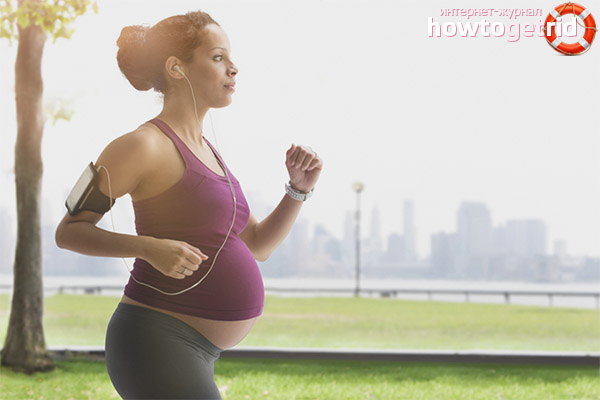The content of the article
Even in our informed age there are still supporters of the prevailing opinion in the past that with the onset of pregnancy, a woman should lead an almost greenhouse lifestyle. But pregnancy is not a pathology, but a physiological condition normal for any healthy woman. And in order to support the body, which has to work for two, you need to eat well, walk, enjoy the world around and play sports.
Of course, such an active life is possible only under the condition that the pregnancy proceeds in a normal mode. Therefore, if a woman used to swim in the pool or run in the mornings, she should not give up such a useful habit for a long time. You just have to slightly change the mode and rules of classes. This will be discussed here.
The benefits of sports
Introduction to physical education is a good thing. No one will dispute this fact, because regular classes help:
- maintain normal muscle tone;
- the natural course of physiological processes in the body;
- maintain optimal weight;
- keep an attractive figure.
It has long been proven that those expectant mothers who regularly engaged in sports before pregnancy can tolerate pregnancy and childbirth. These mothers have healthy babies who are subsequently ahead of their peers in many development indicators.
Therefore, taking into account the past experience of sports activities, doctors usually recommend continuing classes, but reducing their intensity and volume of loads.
An important point! If a woman before the onset of pregnancy was not involved in jogging or any other sport, do not start this in such a difficult period. The only acceptable exception is special sets of exercises for expectant mothers.
A specially designed training program, which will take into account all the individual characteristics of the body, will help strengthen the woman's heart system and maintain muscle tone at the proper level. During training, the expectant mother is recommended to monitor her well-being and not to overwork.
Jogging during pregnancy
The period of bearing a child is a complex physiological process, which every woman goes through differently. Therefore, there are no universal recommendations for all expectant mothers. As for the appropriateness of running during this period, this can only be decided by a doctor who observes the course of pregnancy. The specialist has an idea of the state of affairs, the state of health of his patient and can correctly assess the situation.
If the woman is in good physical shape, doctors usually advise changing the run to yoga, or practicing according to a special program in which there will be an element of respiratory gymnastics. Particular caution should be exercised in the first half of pregnancy, since at this time the risk of miscarriage is especially great.
Only in the second trimester of bearing the fetus, with the woman feeling well, can the doctor allow her to run lightly. But here it’s not worth the risk, but it’s better to switch to hiking in a calm rhythm. In the later stages of pregnancy, for obvious reasons, running is generally impossible.
Important! The expectant mother should be attentive to her condition and make all decisions consciously. It is impossible to predict how her passion for running on a baby will affect her. Therefore, it is better to exclude all risks.
Running during pregnancy is also contraindicated for other, no less serious, reasons:
- During pregnancy, the production of relaxin is enhanced - a hormone that significantly softens the structure of the ligaments. Thus, the body prepares for childbirth so that the fetus can freely pass through the birth canal. But this feature increases the vulnerability of the ligaments and any injury can happen during the run.
- In pregnant women, there is often a violation of blood circulation in the lower body. As a result, swelling on the legs appears. Increased loads on the limbs can only exacerbate the situation.
- When running, blood flow to the tissues of the lungs increases, and this leads to fetal hypoxia.
In the process of running, the body lends itself to vibration, which can provoke premature birth or detachment of the placenta.
List of contraindications
In addition to all of the above, there are a number of absolute contraindications for jogging during pregnancy. These include:
- threatened abortion;
- placenta previa;
- preeclampsia and similar conditions defined by this term;
- any deviations from the norm in the state of health;
- isthmic-cervical insufficiency;
- multiple pregnancy;
- suspected abnormalities of the fetus;
- violation of the uteroplacental circulation;
- regression of the fetus and miscarriage in the history of women.
An important point! Women who have undergone IVF should also refrain from running.
Maternity Running Rules
Despite such a wide list of prohibitions, running during pregnancy is allowed if a woman follows certain rules:
- It is necessary to jog - this method is a cross between normal walking and running. The duration of the training should not exceed ½ hour.
- Easy run - is an alternation of a five-minute run in an average rhythm and fast walking. On the day to engage in this type of run you need no more than 25 minutes.
And a few rules, compliance with which will make training safe:
- if possible, try to run in the fresh air;
- pick up special clothes for training;
- after classes, it is imperative to rest in a supine position with slightly raised legs;
- be sure to warm up before jogging.
A pregnant woman should foresee all the nuances before training: choose a convenient time, take a bottle of clean water with you. Training is best done under favorable weather conditions. If the street is above 25 heat, it is better to postpone the run to another time. Subject to these simple rules, a short run at an easy pace will benefit the unborn baby and give a cheerfulness to a woman.
Video: is it possible to exercise during pregnancy?











Submit